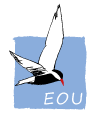IOC, 20 August 2018
Applied aspects of avian urban ecology – an international initiative
Pre-Symposium organized by the European Ornithologist Union
Co-Conveners: Juan Diego Ibáñez-Álamo, Mark Mainwaring, S. James Reynolds and Petra Sumasgutner
Place: Vancouver Convention Centre. Room to be announced.
Duration: 13:00 to 16:00hrs
Contact: [email protected]
Symposium description
Despite the rapid and ongoing global transformation of natural landscapes into urban environments, we still lack a clear understanding of how urbanization impacts ecological interactions and evolutionary processes. Birds have been widely studied in the context of urbanization. On the one hand, important efforts have been made to document the impact of urban sources of ‘stress’ for birds (e.g. pollution, habitat fragmentation, novel predators), as highlighted in the forthcoming IOC-symposium “New Frontiers in Avian Urban Research” (Conveners: Sue Anne Zollinger & Davide Dominoni). On the other hand, there has been an increasing interest in the ‘human side’ of avian urban ecology including, for example, citizen-science engagement, ecosystem services and differences in human-bird relationships across human cultures. Furthermore, a multi-national and collaborative perspective is urgently needed given that despite urbanization being a global process, there are important geographic differences that are based upon (i) regional differences in growth of cities (e.g. building infrastructure, relative amounts of green space, transportation networks), and (ii) demographic patterns (e.g. in Africa mainly the youth is migrating into cities which might result in different requirements for generation of conservation and citizen science initiatives). This EOU symposium aims to identify shared ‘common ground’ by focusing on subjects within applied urban ecology that can be treated as global phenomena, to examine critically the limits of such generalization, and to identify important research gaps. Hence, this symposium will focus on the human and international aspects of urbanization, using an interactive format with the goal of learning from previous experiences, networking and potentially launching an international research initiative to reach out, engage, and jointly develop prospective international approaches.
The symposium consists of three parts: it will start with an oral session, continue with parallel, themed round table discussions, and end with a meeting of the parallel round table groups, which will report and discuss the outcomes.
The oral session will start with an introduction to ‘a global perspective in urban ecology’ provided by Petra Sumasgutner (South Africa), with a focus on geographical bias of studies mostly coming from the Northern Hemisphere and why this might be problematic (10 min). This will be followed by 3 keynote talks (15 min each) by speakers from a wide geographic range. Amanda Rodewald (USA) will talk about how urbanization shapes species interactions, with an emphasis on birds, invasive plants, and predators; Les Underhill (South Africa) will highlight the importance of citizen science in urban studies; and Corey Callaghan (Australia) will talk about which avian traits predict successful urban birds. Thereafter, Juan Diego Ibáñez-Álamo (The Netherlands) will present his proposal for a global network for the study of urban birds (URBICON), and then organize the audience to participate in the ensuing round table discussion sessions (15 min incl. organizing the audience into groups).
In the following round table discussions (1 h), we will highlight features that benefit or, in turn, threaten urban birds, with the goal of conserving native species populations in the urban environment. The parallel round tables will be organized around relevant topics within the URBICON initiative: Human-bird interactions in the city (sociological aspects), Threats to urban birds, Benefits of urban birds for people, Engagement with citizen science communities and Standard methodologies for urban bird studies. These sessions will be led by the keynote speakers and/or conveners.
Finally, for the last 30 min of the symposium we will reconvene to exchange and discuss outcomes from the sessions. One presenter from every round table discussion will provide a summary of the outcomes for the entire audience (5 min each), and after a short final discussion we will close the pre-symposium.

Recent Comments